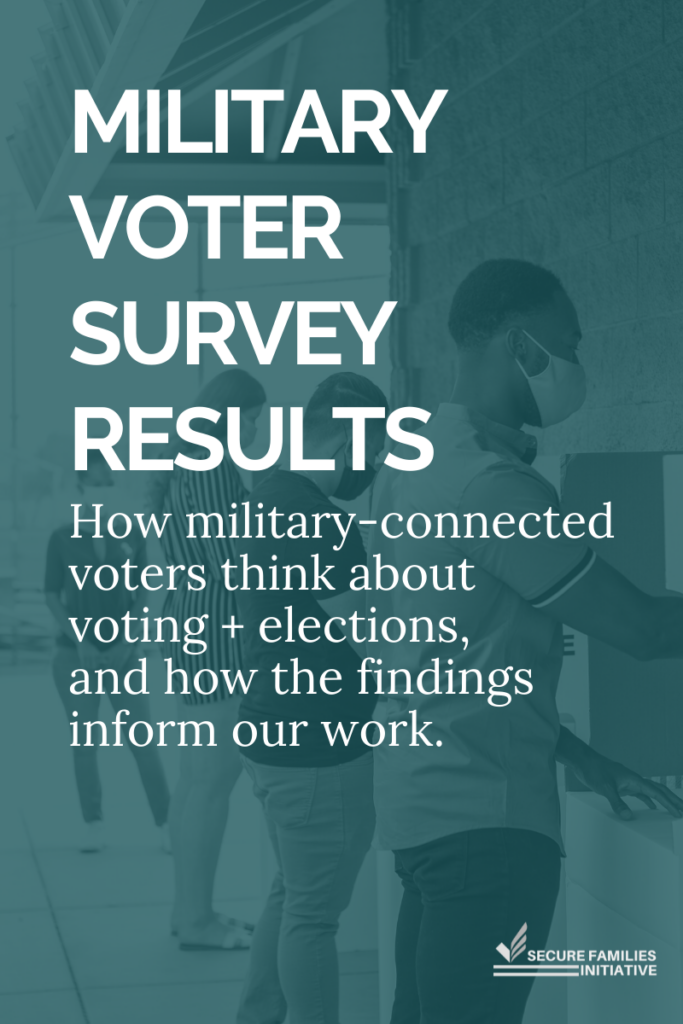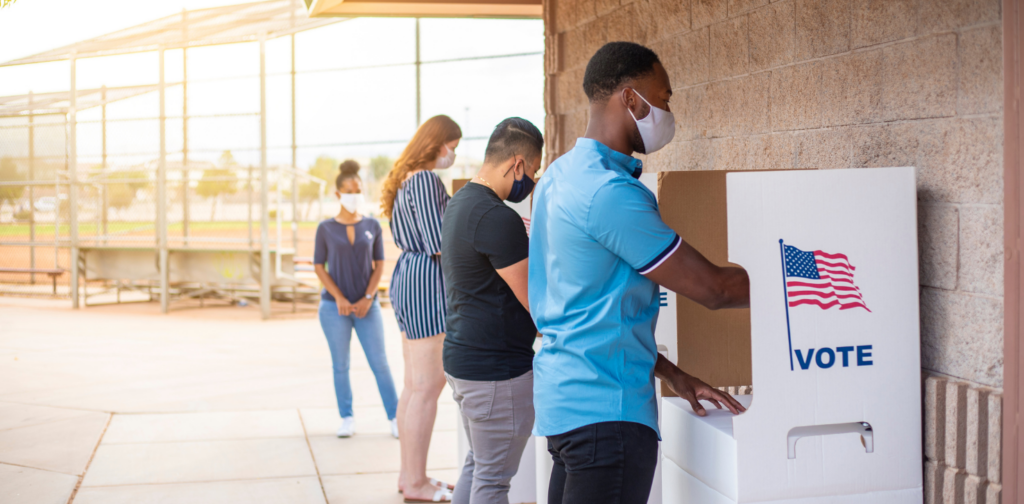By: Janessa Schilmoeller
At Secure Families Initiative, we are dedicated to elevating the stories of military partners and family members on policy matters that impact our community – especially foreign policy. A critical part of making sure our voices get heard begins at the ballot box.
That is why we are committed to increasing access to information and voter participation among military families.
We know through the Federal Voting Assistance Program that military voters had a 14% lower voter registration rate than the general population and a 27% lower participation rate in the 2020 elections than the general population.
We also know that active-duty servicemembers and veterans have been specifically targeted by disinformation campaigns in the past. In 2020, the House Veterans Affairs Committee published a report exclusively on the exploitation of veterans through disinformation campaigns on social media. What we don’t know as much about is how misinformation and disinformation impact military spouses and family members.
That’s why we launched our military voter survey to better understand how folks in our communities think about voting and elections, so that we can play a positive role in increasing voter confidence and enthusiasm later this year and beyond. The results of our survey will guide the work of our voter focus group, which explores how misinformation and misunderstandings impact voting habits in our military communities. Together, we’re working to develop a better awareness of what folks in our community are most worried about when it comes to our upcoming elections and develop solutions to alleviate these concerns.
Tracking confidence in the electoral process
We asked spouses and family members across five military branches to tell us whether their confidence in elections has increased, decreased, or remained the same over the past two years. Over half of all respondents expressed high confidence in the electoral process. 47% expressed that their confidence has remained high, and 9.4% experienced an increase in confidence in the electoral process over the past two years.
While 56% of respondents were confident in US elections, we still found that 30.2% of respondents expressed low or decreased confidence in the electoral process over the last 2 years. Our findings suggest that the decrease in confidence comes from individuals on both sides of the political spectrum. Reasons provided for the decrease in confidence centered around concerns about election security – including ballot counting and mail-in voting – as well as concerns about infighting, divisive rhetoric, and interference from politicians. Some of the fatigue and frustration over the political divisions in our country seem to also be impacting our military communities.
Ensuring military ballots get counted
The military families in our survey largely (71%) believe that mail-in voting is just as secure as in-person voting. This likely reflects the fact that 65% of military voters cast their ballots by mail in 2020, and 87% of all military absentee ballots were submitted by mail in the same year. Despite high confidence in the security of mail-in voting, though, only half (52%) of respondents believe military ballots are actually counted.
Our findings suggest some mistrust and misunderstandings surrounding the mail-in voting process, including:
- Uncertainty around how to track mail-in ballots
- A lack of distinction between absentee and mail-in voting
- Difficulties with voter registration
- Confusion about timelines and submission processes, especially for overseas voters
This is a major priority for us at SFI because we want to make sure that our community of military voters know and trust that their voices can be heard at the ballot box. Nearly every state offers an online service to track mail-in or absentee ballots so that voters can monitor that their ballot arrives and gets counted on time. Voters from one of the four states without online ballot-tracking can call their local election office to confirm whether their ballot has been received and counted.
How to get your questions answered
If you have questions about voting, join SFI and the Military Vote Coalition for a Q & A with the Federal Voting Assistance Program on March 15th at 12pm ET to get all your questions answered ahead of the 2022 midterm elections.
Worried about missing a deadline? Sign up for custom election reminders about registration deadlines and voting dates for your state.
We hope to use this initial data as a starting point for future studies on how misinformation and targeted disinformation might impact confidence and voting habits among military spouses, veterans, and families. If you would like to learn more or get involved with our voter focus group, please reach out to us at info@securefamiliesinitaitive.org.
Listen to Janessa discuss these findings on the Disruptive Storytelling Among Military Changemakers podcast.
A member of the SFI Volunteer Corps, Janessa Schilmoeller is leading our Voter Focus Group and the Military Voter Survey. Janessa is a global educator and content writer who specializes in articles and blogs spanning foreign affairs to social justice education. Connect with her on LinkedIn to learn how she can translate your vision into digestible content that resonates with your audience.


